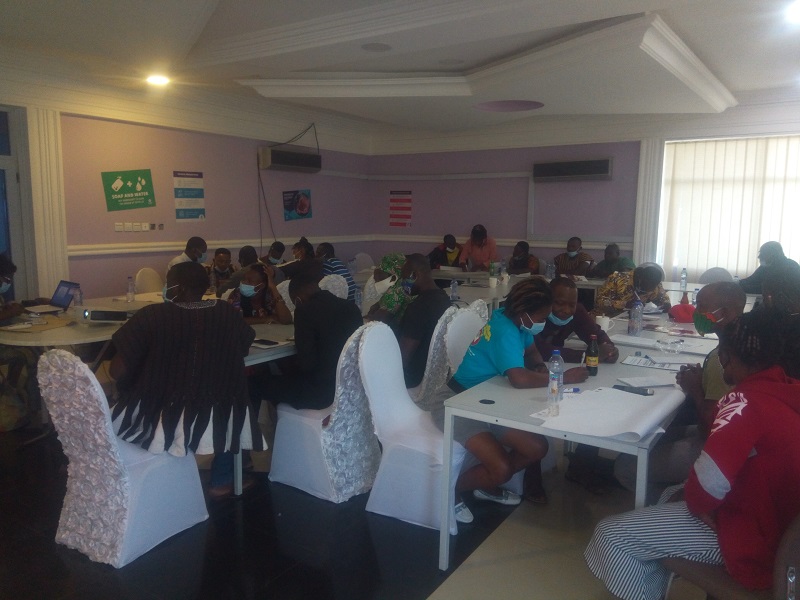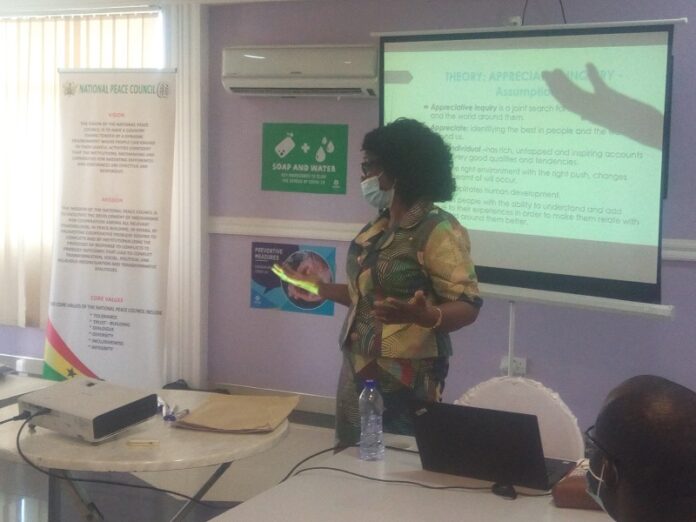|
Getting your Trinity Audio player ready...
|
The National Peace Council (NPC) and the Ashesi University have commenced a two-day training programme for 22 youths drawn from five constituencies identified as ‘hotspots’ in the Upper East Region ahead of the upcoming general elections.
The ‘hotspot’ constituencies, according to the NPC’s Upper East Regional Secretary, Ali Anankpieng, are Builsa South, Bongo, Navrongo Central, Bolgatanga Central and Talensi.
“We decided that we should tackle these constituencies not because of any violence that has been recorded there but because of the intense competitive nature of the campaign among the political parties. The competition is quite hot. We are not saying it is violent but what we are saying is that once it is competitive, it is good to start thinking now how to prevent conflict emerging from that hot competition.

“The majority of the participants are from Builsa South and Bongo. They are being trained as peace ambassadors to go back and apply the skills of conflict management and dialogue to any emerging situation in their areas. When they go back, they don’t need to wait for conflict to begin before they start preaching peace; it is both the prevention of conflict and promotion of peace,” Mr Anankpieng told journalists at the event.
Giving the reasons the training spotlight was centred on the youth, the Secretary said: “The youth are the future leaders and game-changers. You, therefore, cannot engage any sector of the society in the efforts of development without the youth. You must include them and peace building is one important aspect of society that needs the views of the youth to be included. The youth are not just the future; they are even the present.”
“You must have peace in you to be good ambassadors”— Ashesi University Lecturer
Sponsored by the Commonwealth Secretariat and themed “Dialogue Sessions with the Youth in selected ‘hotspots’ on Conflict Prevention Before, During and After 2020 Elections”, the training programme also had the President of the Ghana Association of Certified Mediators and Arbitrators (GHACMA), Dr. Enyonam Canice Kudonoo, as a resource person.
Dr. Kudonoo, who doubles as a Senior Lecturer at the Ashesi University, underscored the need for the participants to practise what they preached as peace ambassadors as she took them through the Importance of Peace and the General Principles of Dialogue among a number of topics she dealt with at the workshop.
“You want to become a good peace ambassador? You can only become a good peace ambassador if you have peace inside you. But how many of us have peace inside us? Within us there is so much conflict that even when we are walking, the ‘wind’ that blows around us is enough to create conflict between us and others. The ‘wind’ that is blowing around you is enough to pull down a whole region. If you have peace in yourself, you can promote peace.
“Why don’t you work on yourself? It’s important. Ask yourself— do I have peace in me? Does the air that blows around me bring peace? Am I so anxious? If you are so busy trying to grab [resources] left, right, centre, you would create conflict. Discover yourself in order to be a good peace ambassador. At times, you physically look at some people who say they are peace ambassadors and you would realise that everything about the person is conflict. To be a good ambassador, manage your own self. Be who you must be in every single step you take and make sure tomorrow there is no skeleton in your cupboard. Then, you can confidently say you are a peace ambassador and people would like to be like you,” she stressed.
Speaking to the participants through a virtual link, a Senior Director of the Commonwealth’s Governance and Peace Directorate, Prof. Luis G. Franceschi, lauded Ghana’s reputation for having organised peaceful elections over the years and urged the country to reaffirm the good example it had been at the upcoming polls.
“Today, the Commonwealth is standing shoulder to shoulder with you. We recognise that any investment in young people is investing in the future. Over 60% of the Commonwealth population is young, is below 30. The majority, absolute majority, of Ghana’s population is below the age of 25. This is a huge responsibility. The effort that Ghana has made to challenge vigilantism is so important. This is another innovation that the other Commonwealth countries experiencing similar challenges might learn from,” remarked Prof. Franceschi.
Representatives from the Ghana Police Service, the NPC and the National Commission for Civic Education (NCCE) are expected to address participants at the workshop on the Vigilantism Act in a panel discussion scheduled for Thursday.
By Edward Adeti, Upper East Region, Daily Mail GH





